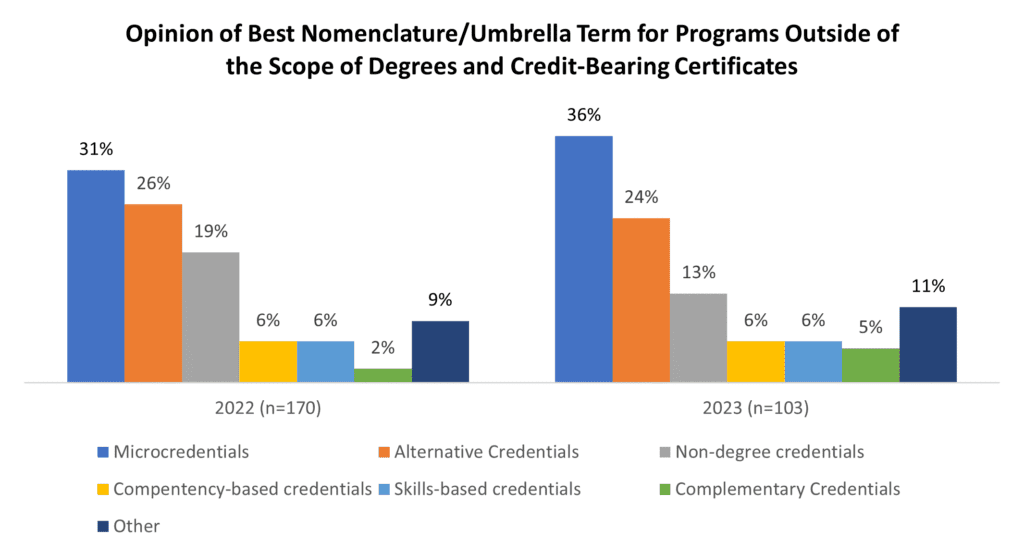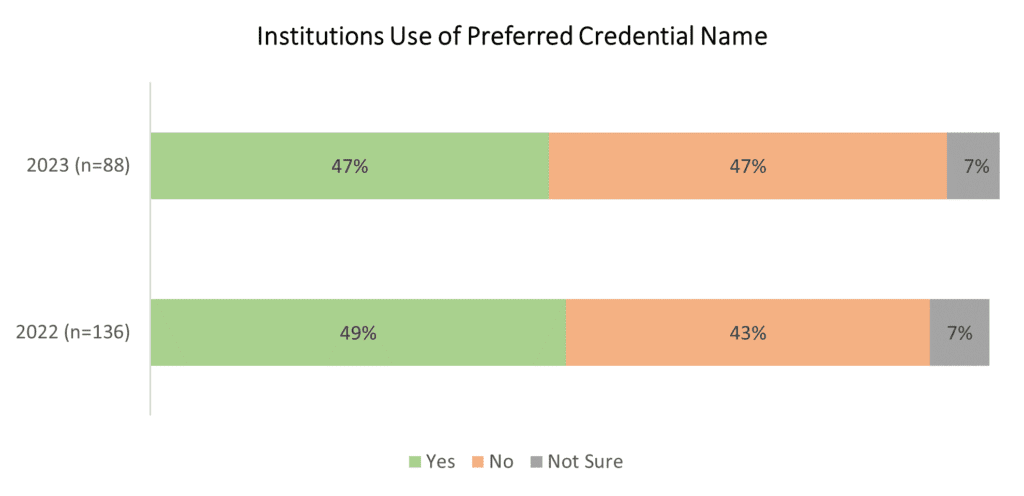What’s in a Name? Why Higher Education Needs to Standardize Nomenclature to Enable Programmatic Adoption

By Bruce Etter
My wife and I were lucky enough to recently welcome our first child into the world. In the months and days leading up to his birth, we regularly discussed potential names for our new family addition. We kept a shared list of ideas that we frequently revisited. A name would be added based on family significance or history, or removed because it was too popular or too obscure. We wanted a name that was able to capture the lineage of our child but also embraced the hope and promise of the ideals we want him to embody. Frequently, I found myself asking, what’s in a name?
When someone encounters a name, regardless of the medium, that name creates an automatic judgmental response in that person’s mind. Bestowing a name on something gives it importance by associating it with a particular emotional response, and labeling a concept determines how it is perceived by the individual.[1] Psychologically, naming enhances a sense of control and ownership, which bonds us to the designated label. [2]
Confusion and frustration can emerge when an object has many different names. For example, when recently shopping for new night tables, I discovered that stores had their own term for the same item. Some referred to the object as a nightstand, while others called it a night table, bedside table, or end table, among other variations. Although I knew what I wanted, I spent more than an hour researching the same item under numerous names, which left me frustrated and I eventually abandoned the idea of making a purchase altogether. When there is a lack of nomenclature consensus, it can lead to consumers feeling confused and reluctant to make a purchase. Higher education finds itself at a nomenclature crossroads when naming emerging credentials.
In August 2022, UPCEA conducted a snap poll that revealed a prevailing uncertainty surrounding the appropriate terminology for non-degree credentials. While microcredential was the most preferred term, it accounted for only 31% of the sample. In August 2023, we repeated the snap poll to see if any change had occurred over the last year. Once again, micro-credential was the most preferred term, but only slightly more, accounting for 36% of the sample.

These differences in program nomenclature also play out at the institutional level. Findings from the 2022 and 2023 snap polls indicated that almost half of these institutions do not use the name microcredential, the preferred term identified by respondents, when referring to programs other than degrees and credit-bearing certificates.

These data points highlight disparity within the realm of higher education when classifying non-degree programming. If consensus eludes even those within the industry, it raises a compelling question: How can we reasonably anticipate students and employers to possess a clear understanding of these credentials and their associated value?
A 2023 study by UPCEA and Collegis Education titled The Effect of Employer Understanding and Engagement on Non-Degree Credentials found that just over two-thirds of employers (69%) were extremely (33%) or very familiar (36%) with non-degree or alternative credentials offered by institutions of higher education. One of the most important takeaways from that research was that awareness is a key driver of adoption. As awareness of non-degree or alternative credentials increased, so too did the likelihood that their organization would use them to benefit their workforce. Among employers who were extremely familiar with these credentials, 82% said their organization would be extremely or very likely to use them compared to 26% of employers who were not very or not at all familiar with them.[3]
Employers may have reservations about the credibility of alternative credentials. About two-thirds (65%) desire proof of program effectiveness, possibly due to discrepancies in how these credentials are delivered, assessed, and accredited. To address this concern, one approach is to engage employers in the development of the credentials. Surprisingly, fewer than half of the survey participants (44%) have ever been approached by institutions to contribute to the creation of alternative programming, even though more than two-thirds of employers (68%) indicated a high level of interest in such cooperation. Clearly, they are keen on harnessing the potential of microcredentials but currently face limited opportunities for collaboration with higher education institutions.[4]
One of the objectives of postsecondary education is to empower individuals to enhance their intellectual growth, enabling them to effectively address the evolving demands of a continuously shifting environment. When obstacles such as monetary restrictions, limited access, and time constraints hinder participation in academic and professional endeavors, many students are left with untapped potential for academic and intellectual progress. Non-degree credentials, such as bootcamps, certificates, and microcredentials, help to serve more learners by addressing some of the long-standing limitations of traditional higher education such as accessibility and personalization of courses. They also offer institutions the advantage of diversifying revenue streams and establishing new on-ramp pathways for existing programs. What once emerged as a means to fill a gap between degree programming and skills employers seek, alternative credentials have become the focus among new learners who turned to non-degree programming to avoid the shortcomings of traditional degree offerings and meet workforce needs for a fraction of the cost.
However, establishing a chain of trust in the credential-issuing process will be a key driver in this shift towards non-degree programming. Some HR professionals are still wary of the rigor and comprehensiveness alternative credentials provide towards a particular skillset. But going forward, the way an employee is screened will need to determine whether non-degree training is adequate preparation for a position versus a traditional college education.[5]
While higher education has the necessary vocabulary, it is time for us to find consensus. The clarity and consistency of terminology not only enhances communication and understanding of these credentials to students and employers, but also plays a pivotal role in the shaping of institutional policies, educational offerings, and the overall learning experience. These credentials should foster productive collaborations among institutions, students, employers, and other key stakeholders, thereby cultivating a more cohesive and purpose-driven educational environment. Standardizing and solidifying nomenclature is not merely a matter of semantics; it is a fundamental step towards the progress of higher education.
Bruce Etter, Senior Director of Research & Consulting, is responsible for developing and managing research initiatives for UPCEA Research and Consulting and its clients. He graduated from Penn State University with a Bachelor’s of Science in Sociology and a minor in Sustainability Leadership.
[1] https://www.newyorker.com/tech/annals-of-technology/the-power-of-names
[2] Stoner, Jennifer & Loken, Barbara & Stadler Blank, Ashley. (2018). The Name Game: How Naming Products Increases Psychological Ownership and Subsequent Consumer Evaluations. Journal of Consumer Psychology. 28. 130-137. 10.1002/jcpy.1005.
[3] https://core.upcea.edu/HigherLogic/System/DownloadDocumentFile.ashx?DocumentFileKey=8e59f127-8e1a-7eba-93c8-62b895b30fe7&forceDialog=0
[4] Ibid
[5] https://www.usatoday.com/story/special/contributor-content/2023/08/30/alternative-and-micro-credentials-are-the-future-of-workforce-education-says-expert-hrcp/70721235007/
Learn more about UPCEA's expert consultants.
Do you need help with your PCO unit or campus? We can help. Contact UPCEA Research and Consulting for a brief consult. Email [email protected] or call us at 202-659-3130.
Trusted by the nation's top colleges and universities, UPCEA Research and Consulting provides the best value in the industry today. UPCEA's industry experts have years of experience in Online and Professional Continuing education - put them to work for you!
UPCEA Research and Consulting offers a variety of custom research and consulting options through an outcomes-focused pricing model. Find the option(s) that best suit your institution.
Learn more about UPCEA Research & Consulting
The UPCEA Difference
Unmatched Experience: For more than 100 years, UPCEA consultants have exclusively served the needs of online and professional continuing education programs. UPCEA consultants leverage their extensive industry expertise to expedite solutions, anticipate upcoming shifts, and offer distinct best practices, effectively aiding clients in achieving their goals.
Cost Effectiveness: As a nonprofit, member-serving organization, we provide unmatched value, allowing you to maximize limited research and consulting budgets.
Action in Motion: Our cadre of experienced, skilled authorities and expert practitioners propels you forward, translating research and consulting into impactful implementation, a distinctive hallmark of UPCEA. Our team of current and former institutional leaders will support you, turning research and consulting into action.
Mission Alignment: Like you, our mission is to enhance and expand educational opportunities and outcomes for adult and other non-traditional learners. We share your values and work in partnership with you to advance access and excellence in education.
